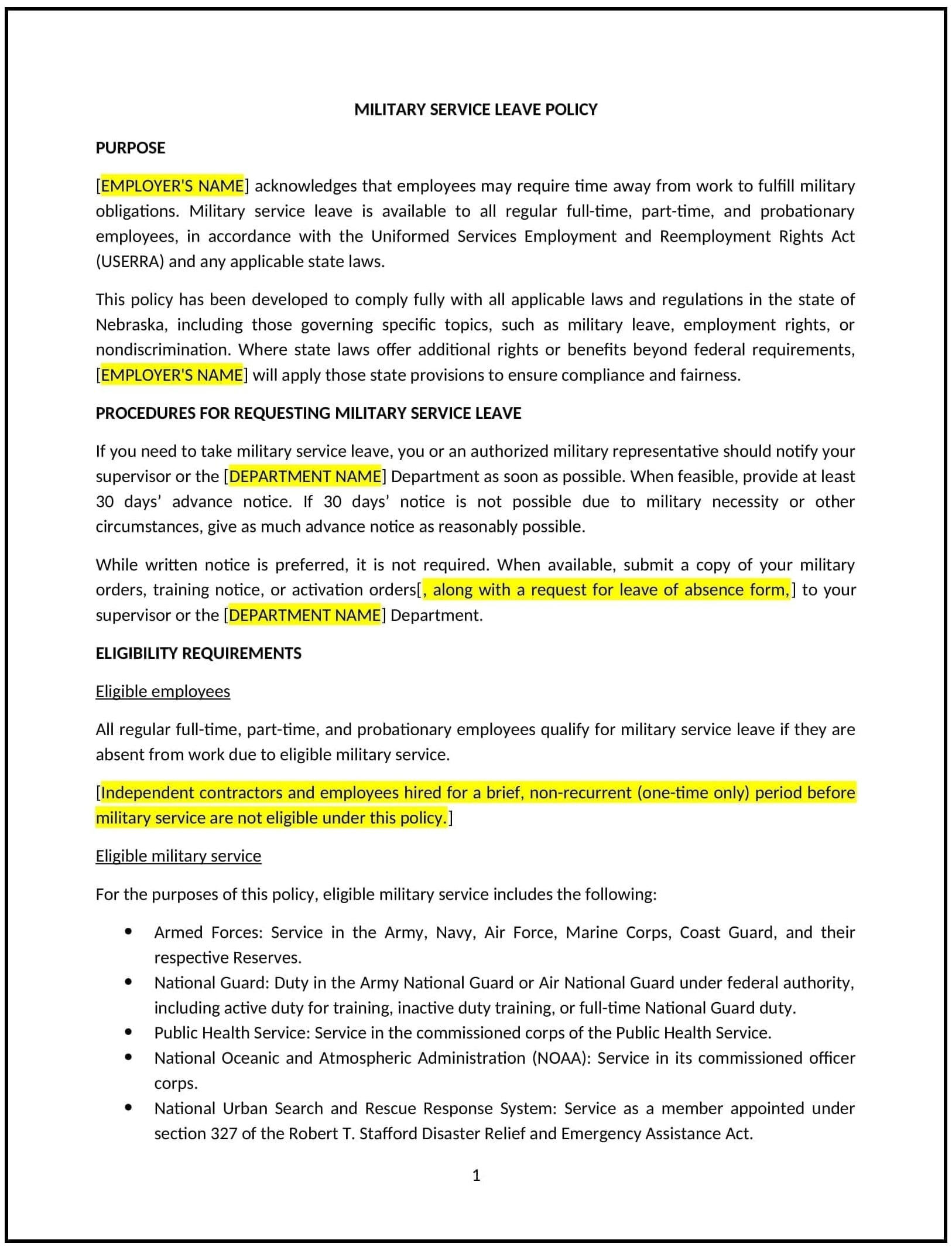Military service leave policy (Nebraska): Free template
Got contracts to review? While you're here for policies, let Cobrief make contract review effortless—start your free review now.

Customize this template for free
Military service leave policy (Nebraska)
A military service leave policy helps Nebraska businesses provide support and clear guidelines for employees who need to take leave for military service or training. This policy outlines the company's commitment to accommodating employees who are members of the National Guard, Reserves, or active-duty military personnel. It specifies how employees should request military service leave, whether the leave is paid or unpaid, and the protections employees have when returning to work after their service.
By adopting this policy, businesses in Nebraska can honor the service of their employees, maintain operational continuity, and provide the support necessary to balance work and military commitments.
How to use this military service leave policy (Nebraska)
- Define eligibility for military service leave: Clearly define which employees are eligible for military service leave, such as those who are members of the National Guard, reserves, or active-duty military. Specify whether the policy applies to all employees or only full-time employees and any requirements for service verification.
- Outline the leave request process: Employees should be instructed to submit a request for military leave with sufficient notice, typically providing documentation such as a military order or a statement of service. The policy should specify how much notice is required, whether the request is made in writing, and any necessary documentation.
- Clarify paid or unpaid leave: Specify whether military service leave is paid or unpaid. The policy should outline whether employees will receive full salary or partial pay during their time away, or if leave is unpaid, and whether employees may use other paid time off (PTO) or vacation days for military leave.
- Job protection and reinstatement: The policy should clearly state that employees are entitled to return to their previous role or an equivalent position once their military service is completed. This includes any benefits accrued during their absence and protections against discrimination or retaliation for taking military leave.
- Address benefits during military service: Specify how employee benefits, such as health insurance or retirement contributions, will be handled during military service. Some companies continue providing benefits, while others may require employees to make arrangements to maintain coverage.
- Provide support during extended service: For employees serving extended military duty, the policy should outline how the company will handle situations where employees may be absent for extended periods. This may include temporary adjustments to job responsibilities, use of accrued leave, or assistance with transitioning back to work upon return.
- Communicate rights and responsibilities: The policy should include information about the rights and responsibilities of both the employee and employer during the leave period. Employees should be informed of their rights under the Uniformed Services Employment and Reemployment Rights Act (USERRA), as well as any state-specific laws or benefits.
- Review and update: Periodically review and update the policy to ensure that it reflects any changes in federal or Nebraska state law, as well as evolving business needs and best practices regarding military leave.
Benefits of using this military service leave policy (Nebraska)
This policy provides several benefits for Nebraska businesses:
- Supports employees’ service obligations: By offering clear guidelines and support, businesses can help employees balance their military duties with their professional roles, honoring their service while maintaining a productive work environment.
- Ensures legal compliance: The policy helps businesses comply with federal and state laws, such as the Uniformed Services Employment and Reemployment Rights Act (USERRA), which protects the rights of employees who serve in the military.
- Improves employee retention: Employees who feel supported in balancing work and military service are more likely to remain loyal to the company and return to work after their service, reducing turnover and associated costs.
- Promotes a positive workplace culture: Offering military service leave demonstrates the company’s commitment to supporting employees and respecting their civic duties, which enhances employee morale and fosters a sense of community.
- Minimizes operational disruption: By establishing a clear process for military leave and job reinstatement, businesses can plan ahead for potential absences, ensuring minimal disruption to operations.
Tips for using this military service leave policy (Nebraska)
- Communicate the policy clearly: Ensure that all employees are aware of the military service leave policy and understand their rights and responsibilities. Include the policy in employee handbooks, and provide it to employees during onboarding.
- Provide clear instructions for leave requests: Clearly outline the steps employees should take to request military service leave, including how much notice they must provide and what documentation is required. The policy should also specify how employees can contact HR to discuss military service leave.
- Ensure transparency in job reinstatement: Make sure employees understand that they are entitled to return to their original position or a similar role after their military service. Provide information about the reinstatement process and how to address any issues that may arise upon their return.
- Stay informed about legal requirements: Keep up-to-date with federal and state laws related to military leave, including USERRA, to ensure that the policy remains compliant with all legal obligations.
- Offer support during extended leave: For employees on extended military duty, consider offering additional support, such as flexible work arrangements or temporary role adjustments, to make their transition smoother when they return to work.
- Review the policy regularly: Periodically review and update the policy to ensure it reflects any changes in laws, company operations, or employee needs. This will help ensure that the policy remains relevant and effective.